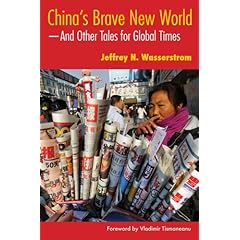The Parallels Between China's Olympics and Our Political Conventions
 When the media spotlight shifted instantaneously from Beijing to Denver last week, it was easy to focus on things that the Olympics and the Democratic Convention had in common as spectacles, especially since each ended with a big party in a stadium where rock music played and fireworks exploded. But if there's a real American sequel to the Beijing Games, it's the Republican Convention underway in St. Paul.
When the media spotlight shifted instantaneously from Beijing to Denver last week, it was easy to focus on things that the Olympics and the Democratic Convention had in common as spectacles, especially since each ended with a big party in a stadium where rock music played and fireworks exploded. But if there's a real American sequel to the Beijing Games, it's the Republican Convention underway in St. Paul.
It’s true that in Denver one big story involved long-term rivals working together to achieve a new goal. This is definitely an Olympian theme in the era of “Dream Teams” made up of members of competing NBA squads.
Beijing-Denver similarities pale, however, when placed beside the deeper links between China's first Olympics and the latest GOP Convention. Consider these:
The Role of Natural Disasters. The Olympics themselves went ahead as scheduled, but China’s leaders had to alter some features of the torch run due to the massive Sichuan earthquake, so as not to seem inappropriately celebratory at a tragic moment. This brings to mind the last minute alterations to the St. Paul schedule inspired by the hurricane.
Historical Revisionism. For those familiar with China’s modern history, it was deeply ironic to see leaders of the once fiercely anti-Confucian Communist Party look on approvingly as Confucius was quoted and honored during the opening ceremonies. But we’re now seeing something just as drenched in irony: the GOP presenting itself as the party that stands for women’s rights.
Extending Control. China’s leaders saw hosting the Games as a way to buttress their legitimacy. And they used the opening ceremony to encourage people to concentrate on only the good things their Party had done for the country, which explains why on 08/08/08 audiences were reminded of China’s impressive new space program but not the 1989 Beijing Massacre that put an end to the Tiananmen protests. Similarly, the GOP is striving now to emphasize accomplishments and gloss over stigmatic events like the Abu Ghraib scandal as it struggles to keep control of the White House.
For this last reason in particular, the true political sequel to the Olympics is the St. Paul Convention.
Americans trying to understand the international reaction to the three big spectacles that have followed each other in quick succession, like the opening legs of a relay race, would also do well to keep something else in mind. Many people in other lands see the organizations currently in power in the United States and in China as having an important feature in common, even though only one will have to win in a post-spectacle national election to stay in power. Namely, the American Republican Party, like China's Communist Party, is widely seen as having demonstrated a disturbing tendency to take a dangerously unilateral approach to foreign policy of late.
We should not be surprised then if outside of the United States a lot of people watching the spectacle in St. Paul are secretly hoping the same thing as so many Democrats. That it will prove less successful than the Beijing Games were, in the sense of doing less than that extravaganza did to increase the odds that the same organization that now controls a big powerful country will continue to do so for at least a few more years.